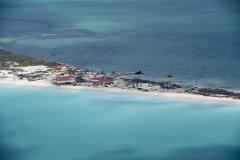- عربي
- 中文
- English
- Français
- Русский
- Español
Statement at the Virtual Event on the Energy Transformation in SIDS
Statement by Ms. Fekitamoeloa Katoa‘Utoikamanu, High Representative for the Least Developed Countries, Landlocked Developing Countries and Small Island Developing States
15 September 2020
New York, USA
Excellencies,
Colleagues,
Ladies and gentlemen,
Thank you, Ambassador Martin Bille Hermann of Denmark and Mr. Francesco La Camera, Director General of IRENA for your invitation to participate in this important event.
More than ever, resilience building to climate change is a must and energy transition is a key factor in this including for building strong foundations for sustainable growth and development.
The 36 participating SIDS, all development partners of the SIDS Lighthouse Initiative and IRENA are true champions in the SIDS Climate Action.
Ladies and gentlemen.
In so many ways, 2020 is defining year and the ongoing COVID-19 pandemic is a disrupter.
Beyond any doubt, in the years to come we all will experience fast and deep structural shifts and downgrades in global growth forecasts.
The pandemic has laid bare more than solely inequalities in access to health care. The pandemic exposes the many inequalities ranging from weaknesses in our economic infrastructures, inequalities in digital access, inequalities in accessing basic supply chains, inequalities in social safety provisions.
Energy always has been at the core of human agency and this pandemic has driven home once more the fundamental importance of robust and sustainable energy systems in managing risks and increasing resilience.
Small island developing states must be included in energy transition for three main reasons.
First, it reduces their heavy dependence on fossil fuels and exposure to price volatilities.
Second, it helps diversify local economies and the expansion of activity into emerging markets. It is a tool to move up in the value chain.
Third, it is not just the sustainable way to go but it can help build resilience in the face of ever increasing tropical storms and hurricanes.
A sustainable energy Guide for Caribbean Countries by SE4All issued in August drives it home.
In just one day, Saint Lucia lost 13,000 jobs – approximately 7 percent of the total population and 16 percent of the total labour force.
The same study argues that for every US dollar invested in the transition towards renewable energy, an additional 93 US cents of additional GDP growth above business as usual is expected to occur.
So, investment in renewables is the smart thing to do!
What has so far held investment back ?
A key factor resides in the high upfront financing cost of a renewable-energy infrastructure.
It is an obstacle for SIDS in achieving their energy transformation.
As I said before, COVID 19 is a disruptor and disruption is an opportunity also.
It is potentially , with the right support, an opportunity for SIDS to pursue their ambitious goals towards 100 per cent renewable energy.
The challenge before all of us is how do we go from vision to action?
Allow me to share with you some thoughts on key areas for accelerating action for a successful energy transformation in SIDS.
Ladies and gentlemen,
I think we can safely say we finally have a broad consensus in the international community that we must act NOW to accelerate the clean energy transition in SIDS.
It is key that governments and the international community work closely together to deliver targeted and effective measures to support the peoples of the SIDS.
Financing is an issue but financing is available.
The hurdle is in accessing that finance.
We must continue to advocate for dedicated funds for SIDS, including within the context of the International Financial Institutions. We must ensure streamlined, speedy finance access processes without of course compromising on transparency and accountability.
We must expand access to concessional financing for SIDS to complement their domestically financed packages.
In terms of the broader picture we must look into, I also must mention the issue of debt sustainability SIDS experience.
Currently, SIDS, like many other societies and economies, are faced with balancing short- term almost survival requirements with medium- and long term imperatives for sustainable and inclusive development paths.
I am sure we all would agree that we cannot postpone investment in sustainable futures.
The collapse of tourism, remittances, and other revenue bases is moving some SIDS from a liquidity crisis to a solvency crisis.
So, I reiterate my call for the establishment of a dedicated debt sustainability mechanism for the SIDS.
SIDS in need should have access to the Debt Service Suspension Initiative, which should be expanded beyond 2020.
Ultimately, what we are faced with is that we can not keep postponing the SIDS’ debt distress.
We must look into debt relief and address institutional inequities in the international debt architecture.
Ladies and gentlemen,
Finally, much more must also be done to strengthen regional collaboration and new partnerships.
The private sector is a key partner in the efforts towards realizing SIDS’ energy transitions.
The generous support from the government of Denmark made it possible for OHRLLS to initiate the SIDS Global Business Network.
That network is all about strengthening private sector engagement in the implementation of the SAMOA Pathway and Agenda 2030.
The upcoming 2020 SIDS-GBN Forum that OHRLLS is organizing together with Palau provides a platform to take discussions forward.
The Forum is a further opportunity to push the strong business case for energy transition in SIDS.
Ladies and gentlemen,
The task ahead is complex. There is no one size fits all response. In our global response package, we must ensure responsiveness to the SIDS’ specific requirements .
It is vital that we now seize the momentum to integrate our short-term responses and recovery plans with the medium and long-term goals on sustainability and resilience.
The investments we make over the next few months in responding to COVID cannot be short term, expedient band- aid. We must ensure their lasting impact on generations to come.
I thank you for your attention.





